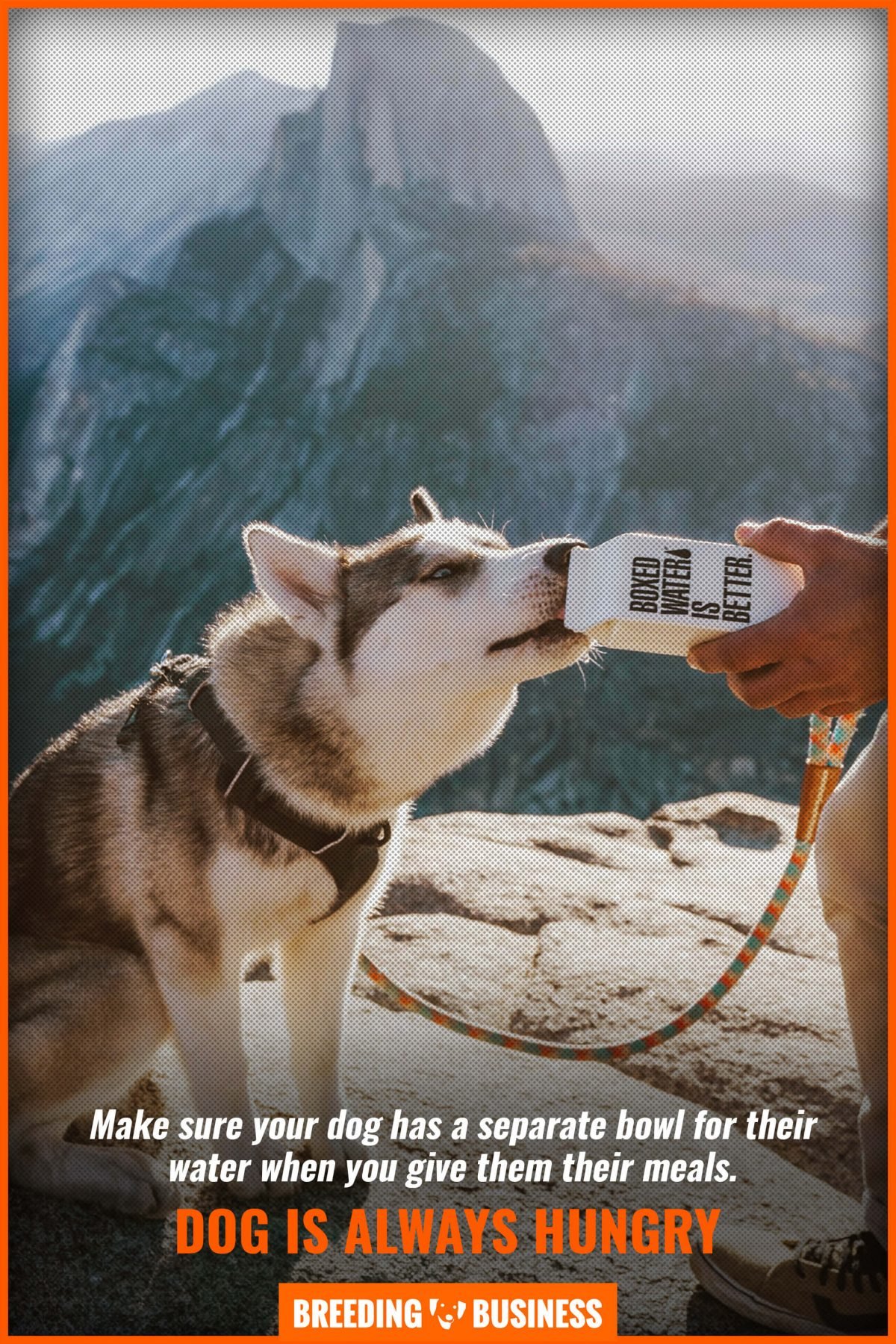It’s tough to see your pup sulking around their eating area, expecting another meal when they’ve just had one. It’s tempting to slip the eager dog a piece of meat or treat to appease its begging. This situation can often make dog owners scratch their heads and ask themselves, “why do dogs never get full?”
Dogs are known to be playful, obedient, loyal, and sometimes greedy eaters. There’s an old phrase people often say, “that dog will eat everything you set in front of it.” And it’s happening to most of the dog parents out there. However, do dogs know when to stop eating or want to munch on something all day long?
Do Dogs Ever Get Full?
“Do dogs get full” is another question that pops into many dog owners’ minds. Sometimes, they’ll give in to those excessing barking and puppy eyes. Moreover, new dog owners, especially those who adopted an adult one, might wonder why their dogs are always starving.
It’s a fact that there are food-obsessed dog breeds that can snatch anything lying around fast like lightning. Some of the breeds are Beagles, Rottweilers, and Golden Retrievers, and they genuinely enjoy their feeding time. However, always observe what they’re eating so that they stay in good shape. The proper observance of your dog’s diet also comes with the right food intake and dietary needs. Dogs come in many shapes and sizes, so they need to have varying amounts of food.
Most dog foods have labels indicating the number of cups you need to feed your dog. The label will show the dog size (toy, small, medium, large) and each size’s weight range. However, it is merely a recommendation. Some books and publications dive into the intricacies of the nutritional needs of your dog. The National Research Council of the National Academies has created a nutritional needs guide for dog owners. The pamphlet gives knowledge of dogs’ daily food intake according to their size, age, and amount of physical activity.
Why Do Dogs Feel Hungry All the Time?
Some dog owners might say things somewhere in the lines of “my dog is always hungry and thirsty.” It’s a bit problematic, especially when they’re getting fat or begging too much. As curiosity is in our nature, we tend to sniff around to know the reason behind why our dog never gets full. Here are some of the factors behind your dog’s hunger:
- Dog’s nature – some will say that it’s their natural behavior. Of course, dogs weren’t always a domesticated animal, and they’re descendants of the wolf. Although that was a long time ago, it is plausible that they still retain some of their wild instincts. Having a “feast or famine” mentality, wolves will eat anything because they don’t know when they’ll have their next meal
- Low to no nutrition at all – another reason dogs want more after a meal is the lack of nutrition in their food. If your dog has an insatiable hunger, check on the food, and maybe their diet is missing something vital
- Health-related reasons – sometimes, there are medical reasons behind your dog’s excessive eating. Dog diabetes, Cushing’s disease, or hyperthyroidism may trigger hunger. If your dog continually gets hungry, a regular trip to the vet can check if they’re sick.
- Psychological aspect – sometimes, dogs can eat a lot when under stress due to recent environmental changes
How to Deal with a Dog That Is Always Hungry?
It’s sometimes annoying and worrying when your dog begs endlessly for food. Here are some ways on how to deal with a dog that is always hungry:
Nutritious Meals
The most important thing you need to check when your dog’s always hungry is their diet. Make sure your meals are complete in terms of nutrition and offer the right mix. Sometimes the reason behind your dog’s voracious appetite is the lack of nutrition in your dog’s meals. Here are some of the crucial elements you need to put in your dog’s food:
- Carbohydrates – put an ample amount of carbohydrates in your canine’s meals as it serves as their secondary fuel to play all day. Dogs get their energy from carbohydrates, so energy from proteins can be used in more vital functions. Excellent sources of carbohydrates are apples, watermelons, potatoes, cauliflower, or cabbage
- Proteins and amino acids – food rich in protein is the essential portion of your dog’s meal plan. Proteins give amino acids, precisely ten, that our four-legged friend cannot produce. The best protein sources are turkey, chicken, beef, salmon, and sometimes plant-based ones like soy
- Fats and fatty acids – this element enhances the taste of the food to make it more delectable and significantly affect your dog’s health. Fat can be in the form of animal fat or plant-based fat
- Fiber – sometimes overlooked and disregarded, fiber is highly vital in a dog’s diet as it makes dogs feel full. Having fiber in meals helps dogs with their digestion and managing their weight
- Vitamins – dogs need to have a regular but moderate intake of vitamins to keep them healthy. There are consequences when you give too much or too little vitamin to your dog. For example, vitamin A gives your dog good vision, but excessive amounts will result in anorexia or conjunctivitis. On the other hand, too much vitamin A will result in artery and vein degeneration or joint pain
- Minerals – twelve minerals are found vital in your dog’s well-being. Like vitamins, excessive or little mineral intake can result in complications
Many food suggestions for your furry friend and diet guides are available online, like the paleo diet. However, you and your vet can create a specialized meal plan that addresses your dog’s needs.
Provide Fresh Water
Like humans, dogs cannot live without water. Although processed food can help get water to your dog, your furry friend needs to have fresh and clean water. Water makes up roughly 70% of the total body weight of an adult dog. A lack of water intake will cause severe outcomes. A decrease of 10% in body water can cause illnesses, while 15% can lead to death. Nonetheless, do not let your dog overdrink or water intoxication that can also lead to mild or severe complications.
Make sure your dog has a separate bowl for their water when you give them their meals. Like their food, water intake can vary from their size and other factors like activity level, weather conditions, and age. Generally, a dog needs to drink half to an ounce of water per pound of their weight every day.

Set a Regular Schedule
If you have a fixed mealtime for your canine, you can train your dog to expect food at the right time. With a regular schedule, dogs will not whine or bark anymore as they know that they’ll eventually get food. Most dog owners either feed their dogs twice a day with a 12-hour interval or thrice a day.
Restrict Access to Kitchen
You can also deal with a dog that’s always hungry to keep them away from the kitchen or dining room. Dogs generally freak out when they’re near food and will bark until you give them a piece of food. Placing a dog fence or distracting your dog when you eat or cook is an excellent way to avoid begging.
Whether Dogs Ever Get Full? – FAQs
There are a lot of dog owners trying to decipher their hungry canine companions. Hence, we’ve compiled some frequently asked questions and answered them.
A meal that lacks nutrition or psychological reasons can lead dogs to overeat or beg for food after a meal. Dogs need to have the right vitamins, minerals, and proteins for their body to function fully and to play around. Moreover, dogs eat a lot whenever they feel stressed or anxious because of a sudden environmental or routine change.
It is best to give your dog a proper and nutritious meal full of fiber. Most fibrous foods are plant-based like carrots, cauliflower, and sweet potato, which are also great carbohydrates. However, there are also different parts of a healthy meal. Dog’s need to have fats and protein that helps in their bodily functions. The right dose of vitamins and minerals will keep them healthy.
The tell-tale sign of your dog being full is there’s no begging or getting your attention to get more food. Dogs get full when they have the right amount of nutrition in their meal and don’t have any underlying complications.
Dogs know when they’re full or not, they’ll eat more when they’re not satisfied with their food and vice versa. The dog’s digestive function is a bit the same as other animals, and they get stuffed when they overeat. However, dogs will eat anything presented in front of them due to the “feast or famine” mentality.
Your canine companion may act like he’s starving due to some health-related reason. Illnesses like diabetes, Cushing’s disease, or hyperthyroidism can trigger their insatiable hunger. Dogs need to eat a lot when they’re sick to compensate for the overuse of their immune system. A veterinarian will help you assess whether your dog’s voracious appetite is health-related.
Dog owners often ask themselves, “are dogs ever full?” Although we adore and cherish our dogs, we can’t always give them food whenever they want. Giving them nutritious meals in their time can ensure any dog parent that their dog is full and satisfied.

One comment on “Do Dogs Get Full – Or Why Do Dogs Never Get Full?”
Very interesting article!
My dog used to just eat a small part of her bowl because she clearly wasn’t that hungry, but she is devouring it like there’s no tomorrow after we got a second dog.
I guess the competition and fear of him taking her food is compelling her to eat what she can.